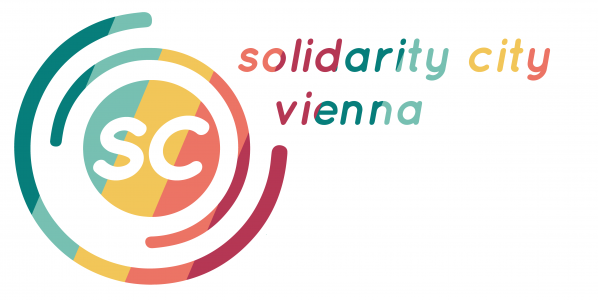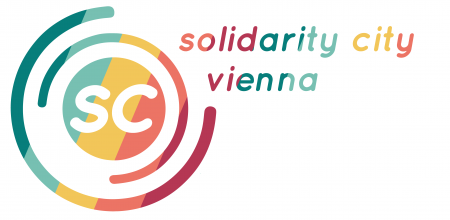About one-third of the food produced worldwide gets thrown away[1]. Since its foundation in 1999, the Wiener Tafel has been providing social institutions such as women’s shelters, homeless care facilities and refugee homes with food and other goods that would otherwise have ended up in the waste bin. It is Austria’s oldest food bank and is run by up to 300 volunteers and 20 permanent employees. With various awareness-raising projects, the association is committed to the fight against poverty, hunger and food waste.
It is early in the morning on a hot summer day near the Großmarkt in Vienna-Inzersdorf. On the edge of the market is the so-called “großes Tafelhaus” (large food bank building) of the Wiener Tafel, Austria’s oldest food bank. The location itself consists of an office building and a large warehouse. A few delivery cars are parked in front of the house with its brightly painted façade. In a small white tent, right next to the building and its big warehouse, you can see two women, surrounded by crates containing mountains of tomatoes, peppers and other vegetables. They are sorting rotten vegetables from good ones. There is a lot of activity going on, boxes full of various groceries are being loaded into the cars. Although the actual market is a few hundred metres away, you can feel a certain buzzing atmosphere here too. In the Tafelhaus we meet Alexandra Gruber, the manager of the Wiener Tafel. She is actually a pharmacist by training and worked in the biotech industry for a long time, but then switched to the NGO sector to do more meaningful work. Alexandra has been the manager of the Wiener Tafel for over five years now, but she calls herself the “Girl for everything”. Starting from this location, Wiener Tafel delivers donated goods, such as food and hygiene articles, to social institutions throughout Vienna and the surrounding area. The mission of Wiener Tafel is to rescue food and to feed people in poverty – but also to raise awareness against socio-political imbalances in society, against inequality and against food waste and poverty.
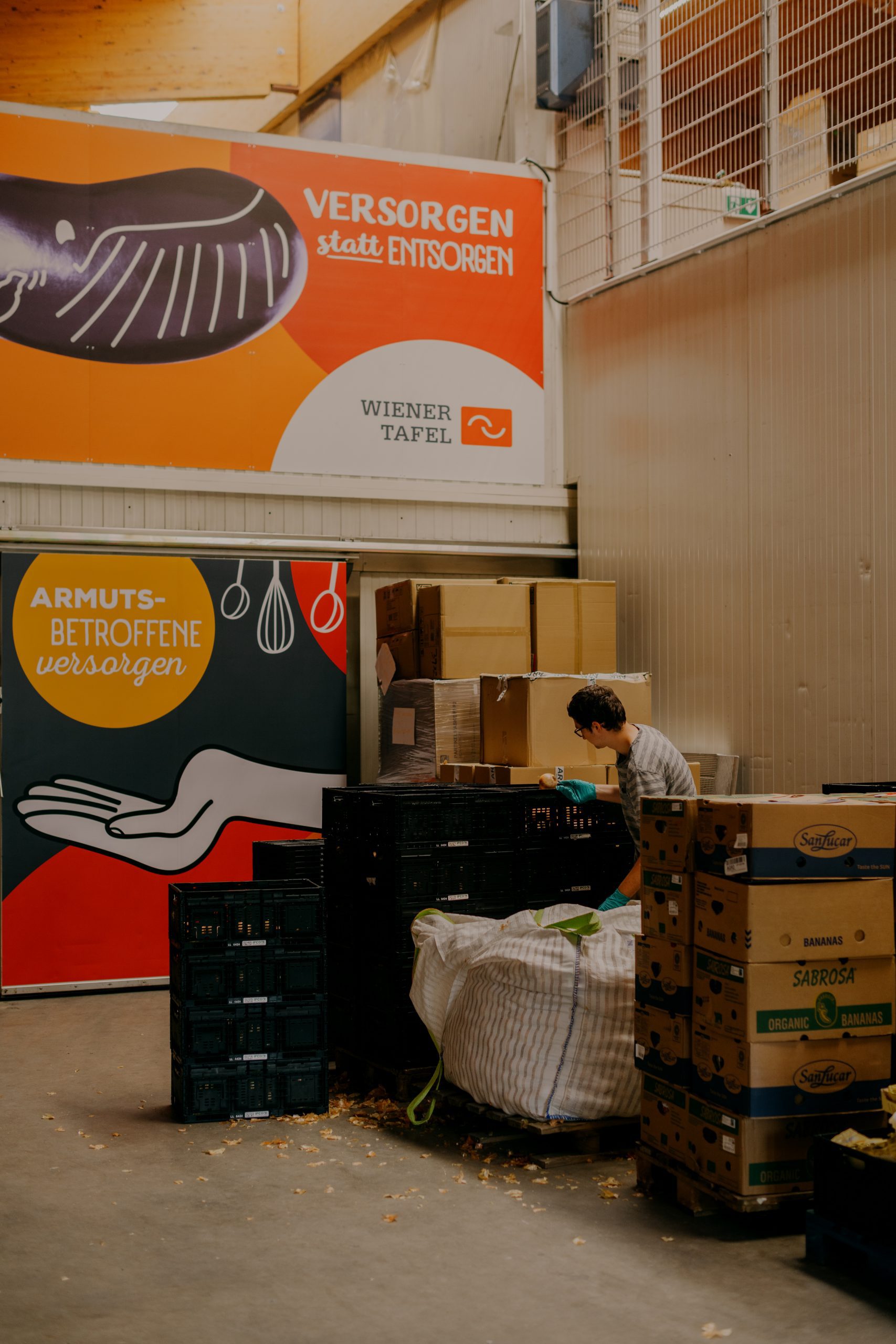
The reality of food waste
The biggest surplus in food waste today is still in the household, the second largest area is agriculture. Wasted food is also responsible for 8% of greenhouse gas emissions. We could apply a lever relatively easily and quickly but these have to be the right levers. “With our awareness raising, we try to show that every individual can do something to stop food wastage. Every household throws away about €300 worth of food. And that doesn’t have to be the case, ” explains Alexandra.
Running a “social delivery company” on the go
In the late 1990s, Martin Haiderer together with students of the Social Academy went on a pilgrimage to Hamburg to see how food banks functioned. Food banks had already existed for several years in other countries in Europe, like Germany, France and Italy. The original idea of such initiatives came to Europe from the United States, where they already existed in the 70s. At that time, the founder of the Hamburg Tafel, Annemarie Dose, promised them: “If you found a food bank in Vienna, I’ll travel to Vienna by bicycle!” Mrs. Dose did indeed travel to Vienna sometime later and on 9 September 1999, the Wiener Tafel was founded and thus assumed the pioneering role in Austria. However, she did not come by bicycle.
With a starting capital of about €360, the first years were hard back-breaking work. In the beginning, following a call for donations, offers of goods were literally received all around the clock. It took a long time before they could afford a refrigerated vehicle and the first real location was established almost ten years after the foundation. Today, the Wiener Tafel team consists of 20 permanent employees and up to 300 volunteers. The Tafelhaus itself was only opened in July 2021 and now offers enough space for efficient food rescue on a total area of 385m², including a warehouse and cold storage rooms.
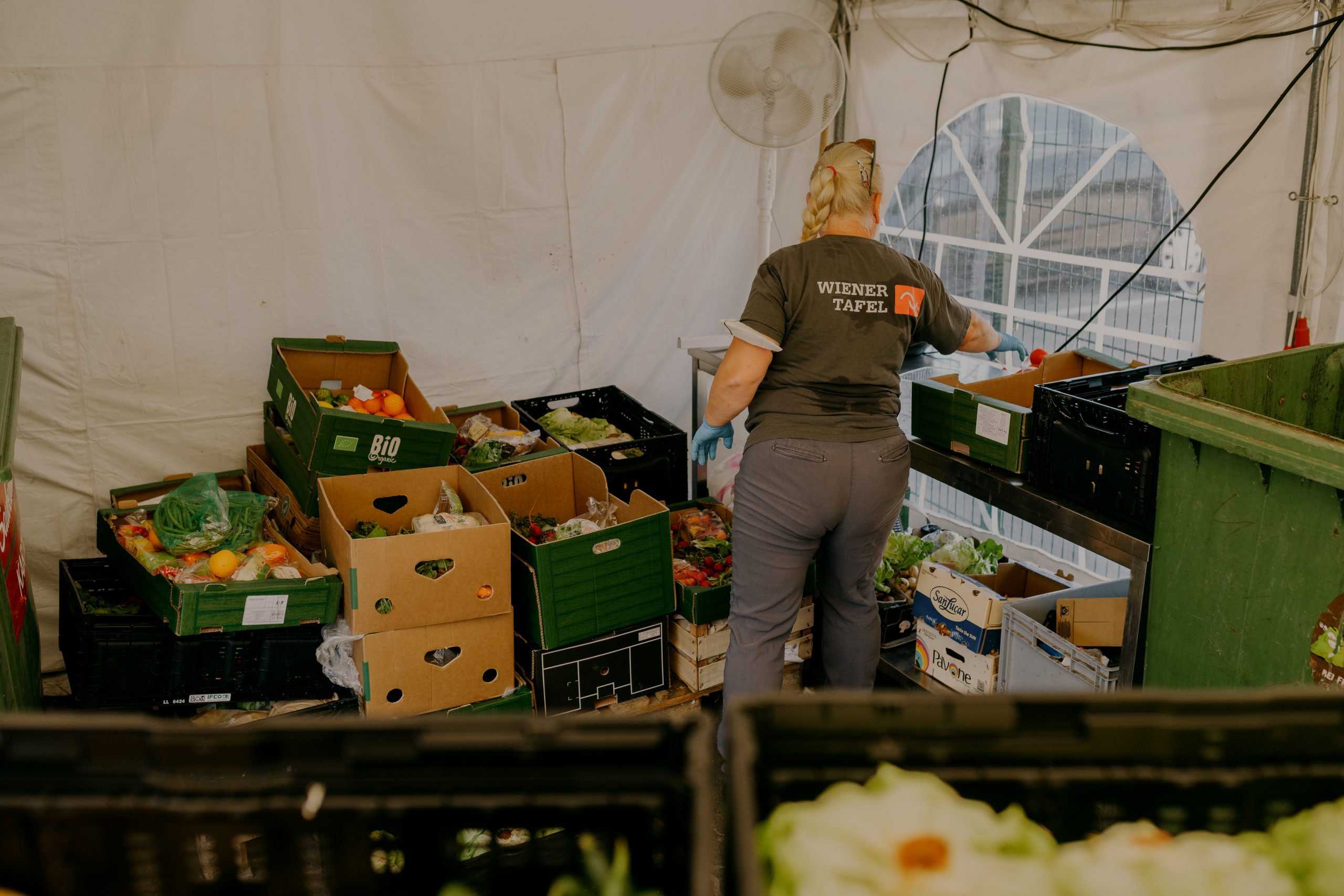
Cooperation from start to finish
Cooperation is deeply anchored in the actions of Wiener Tafel. Most of the donations for the Wiener Tafel come from the beginning of the supply chain, such as farmers and others from the agriculture sector, where large quantities are produced. But often you can’t pass on those products quickly enough without them going bad. In cases like this the Wiener Tafel works together with their professional cook who processes those goods into jams or other kinds of sauces. But there is still much untapped potential, says Alexandra Gruber: “We try to win over producers when they have downtimes and their machines are not working to capacity, if they could put in a batch for us, in the best case for free.” In addition to preservation, this also brings other advantages, as for most people its simpler to cook with processed food, such as tomato sauces. But the Wiener Tafel not only supplies perishable food. According to Alexandra Gruber there is a great demand for hygiene articles: “We also sometimes have a collection day, where we go with volunteers to the supermarkets to collect these items.”
After the Tafel employees have sorted and commissioned the goods, they are sent to social institutions in Vienna. “Our partners have to be social institutions that help those affected by poverty with professional help. In that sense, we see ourselves as a social delivery company”, explains Alexandra Gruber. “Our direct partners are social institutions. They pass it on to their clients because they know the needs of their clients best.”
In total, Wiener Tafel supports about 90 such institutions. About 10-15 come directly to the Tafelhaus to pick up the groceries, the rest gets deliveries from the Wiener Tafel. For small quantities, Wiener Tafel tries to force direct networking between supply and demand with linking the trader with an institution that is in its immediate vicinity.
Volunteering as the foundation
About two thirds of the entire activity at Wiener Tafel is voluntary. That covers the whole delivery system, all the drivers and the food sorters. But volunteers are also needed for various awareness-raising activities or for fundraising at music festivals, for example. In total up to 300 volunteers per year are working for the Wiener Tafel. “That’s why it’s also possible for us to say that with €1 donation we can provide up to ten people with a meal”. But why do so many people volunteer?
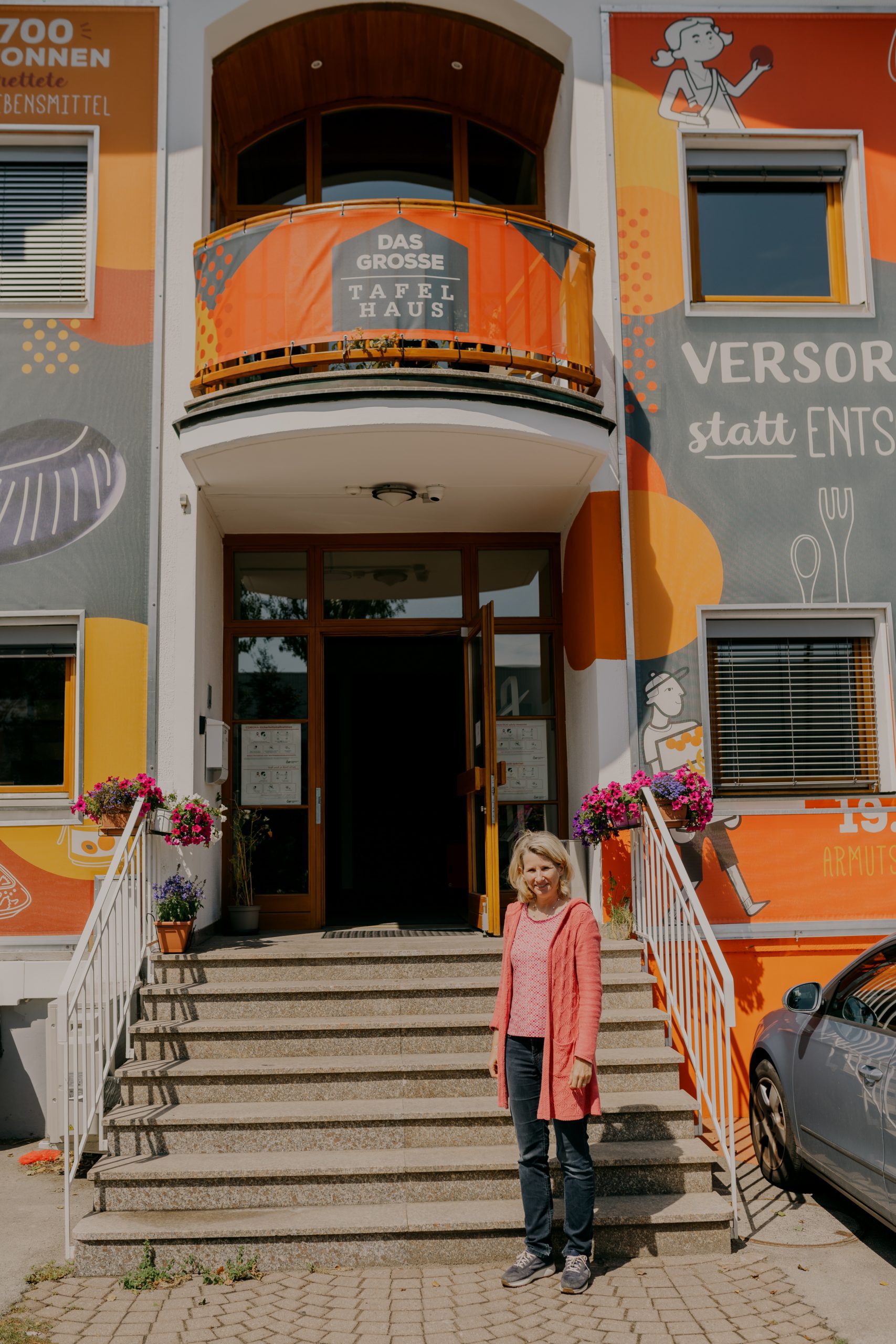
“There are two groups of people who volunteer for us: One group of volunteers comes out of the desire to do something against food waste while the other group comes for social reasons, such as fighting poverty. And so, we are building a bridge between abundance and need.”
But for Alexandra, working for Wiener Tafel is more than just doing something good for society and the environment. Food banks have become places of encounter, where you can meet new people. “It may well be that a university professor works together with an asylum seeker in the delivery car for a whole day. There can happen a lot of change of perspective in the small cabin of the delivery truck when you work five-six hours together and this is what makes it so incredibly exciting because you often get to know new realities and break down prejudices by doing things together.”
With various community-building activities Wiener Tafel manages to create a very broad network of different people who would never meet in normal life. It can happen that volunteers get a job at one of the goods donors, or that an asylum seeker gets employed by a professional cook. But despite the large number of volunteers, the Wiener Tafel, like most food banks worldwide, is primarily financed by private donations and a small amount of funding from the government.
Obstacles and challenges of running a food bank in Austria
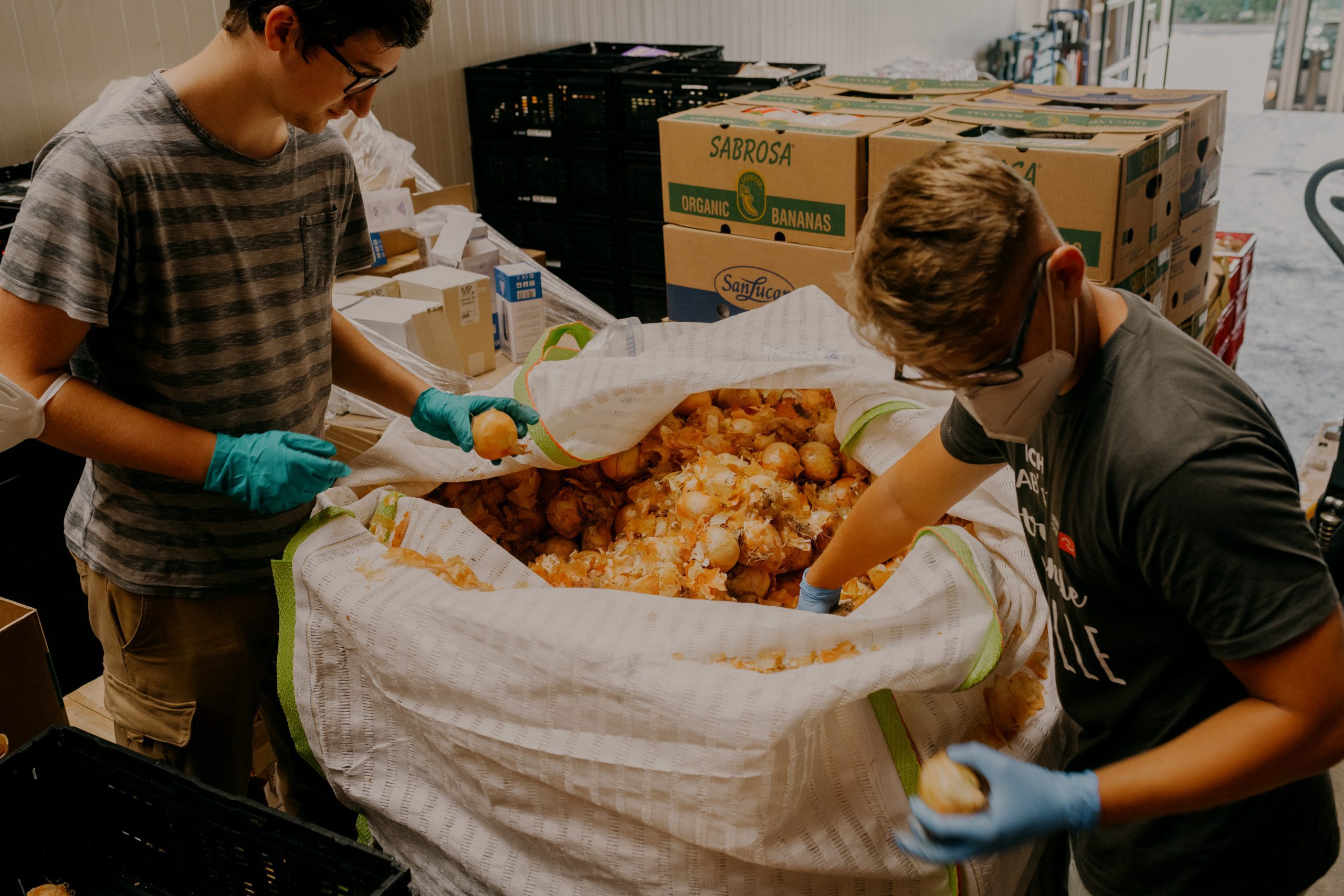
Running a food bank in Austria is not an easy task. There are legal obstacles that make food rescue difficult. In the strict sense of the law, Wiener Tafel are food traders and as a non-profit they have the same obligations as large supermarket chains. In other countries there are exemptions from liability. For instance, the “Good Samaritan Law” in the US exempts people or institutions from liability who donate apparently fit grocery products in good faith to a non-profit organisation.
This leaves the Wiener Tafel with a lot of untapped potential, especially with processed food because the question of liability is still unresolved in Austria if someone gets sick. “That slows us down.”, explains Alexandra. “We see ourselves in the pioneering role for other Austrian food banks, because we are the furthest developed in terms of resources and know-how.” For years the Wiener Tafel has been trying to create new conditions for Austrian food banks together with experts and with the creation of new guidelines and best-practice examples, which would ultimately benefit all food banks in Austria. “We also have to remember that the social crisis caused by Covid will be with us much longer than the health crisis. We must look out for the people so that they don’t fall into the poverty trap.”
Raising awareness for a healthier environment
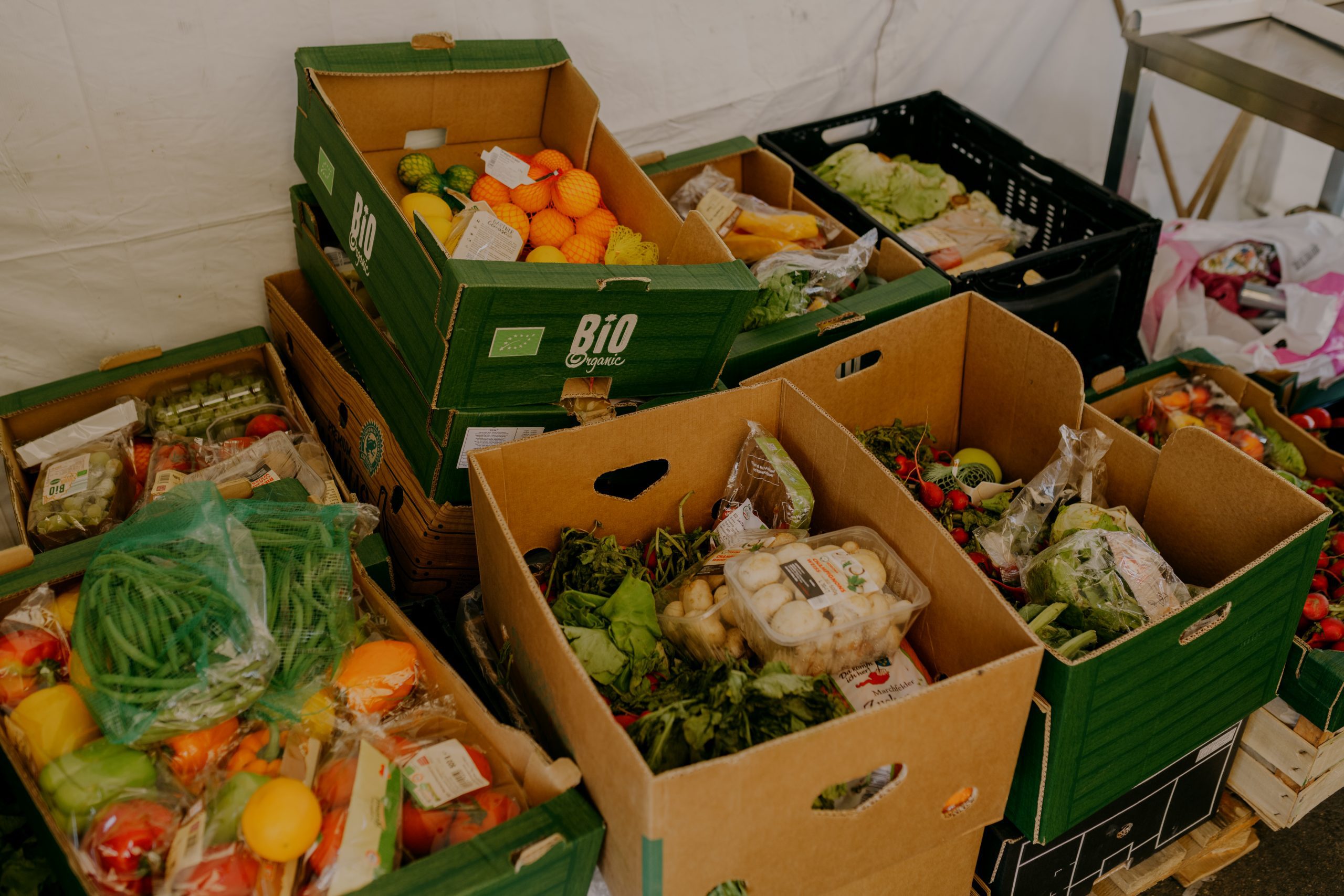
Everyone will agree that food waste is bad, but how do you manage to change the behaviour of people? The Wiener Tafel offers workshops with their professional cook where she explains what you can cook with leftovers and surpluses from the Wiener Tafel, incorporated with knowledge on how to store food properly and how to tell if something is still okay to eat. These resource-intensive workshops require a lot of volunteers and permanent staff, but it seems to be the best way to integrate this behavioural change into one’s own life. In the so-called “Labor mit Sinn” (Laboratory with meaning), children playfully learn to trust their own senses and not just to look at the best-before date. “When they learn by seeing, tasting, feeling and smelling, you notice that change their attitudes. People are no longer dependent on a date but trust their own senses again and thus have a certain independence.”, tells Alexandra. These workshops are very well received. This is also what the Wiener Tafel wants to focus on in the future, as it is the best and easiest way to change the behaviour among children and young people. But also because they can in turn educate their parents. Now the Wiener Tafel is working on bringing the sensory lab into the digital world. This way even more people can be reached and educators can also integrate the information in their everyday school life.
Get involved!
There are different ways to support the Wiener Tafel. If you would also like to lend a hand, the Wiener Tafel is always looking for volunteers. But monetary donations are also welcome. You can find more information on the website.
Wiener Tafel address: Laxenburger Str. 365/A6, 1230 Wien, Austria
[1] https://www.worldwildlife.org/stories/fight-climate-change-by-preventing-food-waste
Interview by David Schermann.
